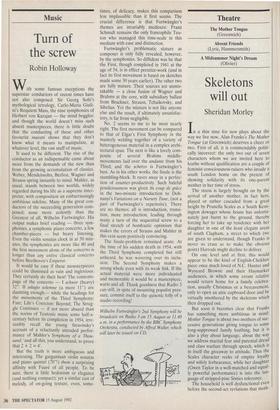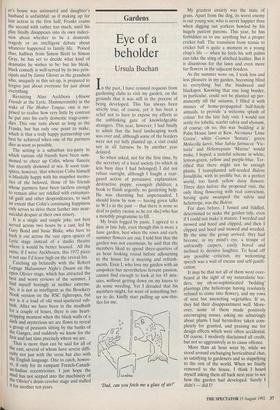Theatre
The Mother Tongue (Greenwich) Absent Friends (Lyric, Hammersmith) A Midsummer Night's Dream (Olivier)
Skeletons will out
Sheridan Morley
In a thin time for new plays about the way we live now, Alan Franks's The Mother Tongue (at Greenwich) deserves a cheer or two. First of all, it is commendably politi- cally incorrect: the only two out of seven characters whom we are invited here to loathe without qualification are a couple of feminist consciousness-raisers who invade a south London home on the pretext of showing solidarity with its one-parent mother in her time of stress.
The stress is largely brought on by the arrival of another mother, in fact hers, played or rather cascaded from a great height by Prunella Scales as a South Kens- ington dowager whose house has unfortu- nately just burnt to the ground, thereby forcing her to take up residence with her daughter in one of the least elegant areas of south Clapham, a street to which (we are given to understand, though Franks is never so crass as to make the obvious point) Harrods might decline to deliver.
On one level and at first, this would appear to be the kind of English-Chekhov piece once much loved of N.C. Hunter and Wynyard Browne and their Haymarket audiences, in which some errant relative would return home for a family celebra- tion, usually Christmas or a bereavement, only to open an attic cupboard door and be virtually smothered by the skeletons which then dropped out. But soon it becomes clear that Franks has something more ambitious in mind: Mother Tongue is about two mothers of suc- cessive generations giving tongtie to some long-suppressed family loathing, but it is also a Play about language, about the way we address marital fear and parental dread and class warfare through speech, which is in itself the giveaway to attitude. Thus the Scales character reeks of empire loyalty and wifely forbearance, while her daughter (Gwen Taylor in a well-matched and equal- ly powerful performance) is into the lan- guage of stripped-pine Sixties tolerance.
The household is well dysfunctional even before the second-act revlations that moth- er's house was uninsured and daughter's husband is unfaithful: as if making up for lost action in the first half, Franks crams the second with rather too much, until his play finally disappears into its own indeci- sion about whether to be a domestic tragedy or an intelligent debate about whatever happened to family life. Poised thus, halfway from Simon Brett to Simon Gray, he has yet to decide what kind of dramatist he wishes to be: but his bleak, black comedy is well-served by its two prin- cipals and by Jamie Glover as the grandson who, uniquely in this set-up, is prepared to forgive just about everyone for just about everything.
Revisiting Alan Ayckborn (Absent Friends at the Lyric, Hammersmith) in the wake of The Mother Tongue, one is sur- prised to realise how very little by contrast he put into his early domestic tragi-come- dies. This one runs about as long as the Franks, but has only one point to make, Which is that a truly happy partnership can best be achieved when one of the partners dies as soon as possible.
The setting is a suburban tea-party to Which various old friends have been sum- moned to cheer up Colin, whose fiancee has recently drowned at sea. It soon tran- spires, however, that whereas Colin himself is blissfully happy with his snapshot memo- ries of the beloved, those of his friends Whose partners have been tactless enough to remain alive are riddled with extramari- tal guilt and other despondencies, to such an extent that Colin's continuing happiness only serves to drive them further into near- suicidal despair at their own misery.
It is a single and simple joke, not best served across two hours by a cast, led by Gary Bond and Susie Blake, who have to bash it out across the vast open spaces of Lyric stage instead of a studio theatre Where it would be better housed. All the same, if I were Ayckbourn, this 1972 piece IS not one I'd leave high on the revival list.
Catching up belatedly with the Robert Lepage Midsummer Night's Dream on the Open Olivier stage, which has attracted the best and worst reviews of the summer, I find myself boringly at neither extreme. No, it is not as intelligent as the Brookery NOok version on the RSC tightropes, but nor is it a load of old mud-spattered rub- bish. After we have been in the mudbath for a couple of hours, there is one heart-
stop–
ping moment when the black walls of a dark and mysterious set are flown to reveal a group of peasants sitting by the banks of the Ganges, and suddenly we know for the first and last time precisely where we are.
That is more than can be said for all of the cast, several of whom have severe diffi- culty not just with the verse but also with the English language. One to catch, howev- er, if only for its rampant French-Canadi- an-Indian eccentricities. I just hope the mud has not seeped into the machinery of the Olivier's drum-revolve stage and stalled it for another ten years.



















































 Previous page
Previous page